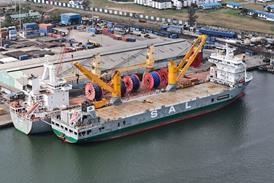March 28 - Overall confidence levels in the shipping industry recovered to their highest level for two years in the three months ended February 2013, according to the latest Shipping Confidence Survey from international accountant and shipping adviser Moo
In February 2013, the average confidence level expressed by respondents in the markets in which they operate was 5.8 on a scale of 1 (low) to 10 (high), compared to the figure of 5.6 recorded in the previous survey in November 2012. The survey was launched in May 2008 with a confidence rating of 6.8.
All categories of respondent expressed increased confidence over the three-month period. The confidence rating for managers of 6.2 (up from 6.0 last time) was the highest since August 2010, while that for charterers was up from 5.6 to 6.0, the highest since November 2010. Confidence on the part of owners was up from 5.5 to 5.7 (the highest since May 2011) while for brokers the increase was from 5.3 to 5.6, the highest level in the past twelve months.
A number of respondents felt that there were positive signs that a recovery was on the way. One said, "Scrapping continues apace, and new orders have all but dried up. These are two of the main drivers for recovery, the third being demand, which will improve, with the result that we should see a measurable upturn by year-end." Another noted, "Demand trends for seaborne trade are generally positive, and tonnage reaching obsolescence due to age and regulation will exit the market. Finance is competitive where available and, where it isn't, owners and their ships will leave the market. Patience and strong cashflow management are essential."
In the opinion of one respondent, "This year will be crucial in determining who will be able to benefit from the upswing in the market when it happens. It will depend on the banks' attitude towards bad debt and increased foreclosure, the increased competitiveness of Japanese shipyards, and the phasing out of uneconomical, old ship designs."
Some foresaw a continuation of difficult market conditions, such as the respondent who noted, "Last year was very difficult, and 2013 is likely to produce similarly meagre yields, so once again it will be all about trying to survive rather than moving forward." In even more pessimistic vein, another respondent maintained, "The shipping market has been getting worse every year since 2008, and there is unlikely to be any improvement in 2013. There are still crazy shipowners ordering new ships which will hit the water in two years' time, so the world fleet will keep increasing at a faster rate than will cargo volumes." Elsewhere it was noted, "Be careful when selecting your counter-parties, and be happy if you are able to cover your expenses in today's market."
A number of respondents were constrained to comment on the role of the banks, and the situation with regard to shipping finance generally. "The lack of available finance severely restricts many good deals from getting off the ground," said one, while another pointed out, "There may be a measurable upturn in the shipping industry by end-2013, but will the banks be with us? I doubt it."
Elsewhere it was noted, "Despite some areas for optimism in specialist niche markets, the cost of capital looks certain to increase. Moreover, there are ominous signs that the German banks will be forced to get to grips with their shipping loans, leading to an increase in enforcements and distressed sales, putting further pressure on asset prices." Another respondent said, "It is beginning to look as if the banks are starting to foreclose, with KGs no longer defying gravity," while another still warned, "Even if banks take action against owners who cannot meet their repayments, the ships will not disappear but will stay in the market and potentially cause problems for other owners who have been able to survive thus far."
Turning to freight rates, the numbers of respondents overall who expressed an increased expectation of higher rates over the next twelve months was up in the three main categories of tonnage covered by the survey.
Moore Stephens shipping partner, Richard Greiner, says, "Another small increase in confidence is very good news. Indeed, two successive quarters of improved confidence is in many ways more encouraging than one sizeable swing. It suggests that confidence is slowly building, indicating the start of a credible recovery.
"The indications are that the worst of the current shipping cycle could be over. But serious challenges lie ahead. Operating costs are going up, particularly fuel and manpower, and there is the added burden of increasing operational and environmental regulation. The cost of complying with the BWM convention has still not been accurately quantified, but it will not be insignificant. Indeed, one respondent likened it to a "ticking bomb which can go off at any moment, demanding enormous investment from already cash-strapped owners, and the banks will probably not be standing in line to support them."

















